- Home
- Sue Grafton
B is for BURGLAR Page 4
B is for BURGLAR Read online
Page 4
I found a drugstore half a block away and bought two packs of index cards so I could make some notes and then I put in a call to Mrs. Ochsner in 317. Finally, she picked up.
“Hello?”
I identified myself and told her where I was. “I’ve just been up there talking to Pat Usher and I don’t want her to know that I’m talking to you. Is there some way we can get together?”
“Well, what fun,” Mrs. Ochsner said. “What shall we do? I could take the elevator down to the laundry room. It’s right near the parking lot, you know, and you could pick me up.”
“Let’s do that,” I said. “I’ll swing by in ten minutes.”
“Make it fifteen. I’m slower than you think.”
The woman whom I helped into the front seat of the car had hobbled out of the laundry room with a cane. She was small, with a dowager’s hump the size of a backpack and off-white hair that stood out around her head like dandelion fuzz. Her face was as soft and withered as an apple doll and arthritis had twisted her hands into grotesque shapes, as though she intended to make geese heads in shadow on the wall. She was wearing a housedress that seemed to hang on her bony frame and her ankles were wrapped in Ace bandages. She had two garments over her left arm.
“I want to drop these off at the cleaner’s,” she said. “You can run them in. I want to stop by the market, too. I’m out of my cereal and half-and-half.” Her manner was energetic, her voice wavering but excited.
I went around to my side of the car and got in. I started the car, glancing at the third floor to make sure Pat Usher wasn’t standing there watching us. I pulled out. Mrs. Ochsner peered at me avidly.
“You don’t look at all like you sounded on the phone,” she said. “I thought you’d be blond with blue eyes. What are they, gray?”
“Hazel,” I said. I lowered my sunglasses so she could see for herself. “Where’s the cleaner’s from here?”
“Right next door to that drugstore you telephoned from. What do you call that haircut?”
I glanced at myself in the rearview mirror. “I guess I don’t call it anything. I do that myself with nail scissors every six weeks. I keep my hair short because I don’t like to fool with it. Why, do you think it looks bad?”
“I don’t know yet. It probably suits, but I don’t know you well enough to say. What about me? Do I look like I sound?”
I glanced over at her. “You sound like a hell-raiser on the phone.”
“I was when I was your age. Now, I have to be careful I’m not just written off as a crank like Ida. All my dear friends died and I got stuck with the crabby ones. What kind of luck are you having with Elaine?”
“Not a lot. Pat Usher says she was actually in Boca for a couple of days and then took off again.”
“No, she wasn’t.”
“Are you sure?”
“Of course I am. She always knocked on the wall when she got in. It was like a little code. She’s been doing it for years. She’d come over within the hour and make arrangements to play bridge with us because she knew how much it meant.”
I parked in front of the cleaner’s and picked up the two dresses she’d placed over the seat. “I’ll be right back,” I said.
I took care of both errands while Mrs. Ochsner waited and then we sat in the car and talked. I filled her in on my conversation with Pat Usher.
“What do you think of her?” I asked.
“She’s too aggressive,” Mrs. Ochsner said. “She tried to cultivate me at first, you know. Sometimes I’d sit out on the balcony in the sun and she’d talk to me. She always had that sooty smell people get when they smoke too much.”
“What’d you talk about?”
“Well, it wasn’t culture, I’ll tell you that. She talked about food most of the time, but I never saw her put anything in her mouth except cigarettes and Fresca. She drank pop incessantly and that mouth of hers flapped all the time. So self-centered. I don’t believe she ever asked me one word about myself. It simply never occurred to her. I was bored to death, of course, and began to avoid her whenever I could. Now she’s rude because she knows I disapprove of her. Insecure people have a special sensitivity for anything that finally confirms their own low opinion of themselves.”
“Did she mention Elaine?”
“Oh yes. She said Elaine was off on a trip, which struck me as odd. I’d never known her to come down here only to go someplace else. What would be the point?”
“Can you tell me who else Elaine might have kept in touch with? Any other friends or relatives down here?”
“I’ll have to think about that. I don’t know of anyone offhand. I assume that most of her good friends are in California, since that’s where she lives most of the time.”
We talked on for a while, but mostly about other things. At 11:15, I thanked her and took her back to the parking lot, gave her my business card so she could call me if she needed to, and then watched her hobble to the elevator. Her gait was irregular, like a marionette’s being worked from above by strings. She waved to me with her cane and I waved back. She hadn’t told me much, but I was hoping she’d be able to report on what was happening here after I flew back.
I drove out to the beach and sat in the parking lot with my index cards, making notes of everything I could remember about my search to this point. It took an hour and my hand was cramped, but I needed to get it down while the details were fresh. When I finished, I took my shoes off and locked the car, walking the beach. It was too hot to jog and the lack of sleep had left me torpid anyway. The breeze coming in off the ocean was dense with the smell of salt. The surf seemed to roll in at half speed and there were no whitecaps. The ocean was a luminous blue and the sand was littered with exotic shells. All I’d ever seen on the California beaches were tangles of kelp and occasional Coke-bottle bottoms worn smooth by the sea. I longed to stretch out on the beach and nap in the hot sun, but I had to be on my way.
I ate lunch at a roadside stand built of pink cinder block while a radio station blared out Spanish-language programs as foreign to me as the food. I feasted on black-bean soup and a bolsa ��� a sort of pouch made of pastry holding a. spicy ground meat. By four o’clock that afternoon, I was on a plane, headed for California. I’d been in Florida for less than twelve hours and I wondered if I was any closer to finding Elaine Boldt. It was possible that Pat Usher was being straight with me when she claimed Elaine was in Sarasota, but I doubted it. In any event, I was anxious to get home and I slept like the dead until the plane reached LAX.
When I got to the office at nine the next morning, I filled out a routine form for the Driver’s License Records at the Department of Motor Vehicles in Tallahassee, Florida, and a second form for Sacramento on the off-chance that Elaine might have been issued a driver’s license in her own name sometime in the last six months. I also sent similar requests to the Vehicle Registration Records in both places, not so much with the expectation of the inquiries paying off, but just to cover my bets. I stuck all four envelopes in my out box and then I pulled out the phone book and started checking addresses for travel agents located within walking distance of Elaine’s condominium. I was hoping to establish her travel arrangements and find out if a plane ticket had been used. So far. I had only Pat Usher’s word that Elaine had ever arrived in Miami. Maybe she never even reached the airport in Santa Teresa, or maybe she got off the plane at some point en route. In any event, I was going to have to check it out item by item. I felt as if I were on an assembly line, inspecting reality with a jeweler’s loupe. There’s no place in a PL’s life for impatience, faintheartedness, or sloppiness. I understand the same qualifications apply for housewives.
Most of my investigations proceed just like this. Endless notes, endless sources checked and rechecked, pursuing leads that sometimes go no place. Usually, I start in the same place, plodding along methodically, never knowing at first what might be significant. It’s all detail; facts accumulated painstakingly.
It’s hard to remain anonymous
these days. Information is available on just about anyone: credit files on microfiche, service records, lawsuits, marriages, divorces, wills, births, deaths, licenses, permits, vehicles registered. If you want to remain invisible, pay cash for everything and if you err, don’t get caught. Otherwise, any good PI. or even a curious and persistent private citizen can find you out. It amazes me that the average person isn’t more paranoid. Most of our personal data is a matter of public record. All you have to know is how to look it up. What your state and city government don’t have on file, your next-door neighbor will usually share without so much as a dollar changing hands. If there was no way to get a line on Elaine Boldt directly, I’d try an oblique approach. She’d left for Boca two weeks early, traveling at night, which, according to Tillie, was something she didn’t like to do. She’d told Tillie she was ill, leaving town on doctor’s orders, but at this point, there was no verification of that claim. Elaine might have lied to Tillie. Tillie might be lying to me. For all I knew Elaine had left the country, planting Pat Usher behind her to promulgate the notion that she was in Sarasota instead. I hadn’t any idea why she’d do such a thing, but then I had a lot of ground to cover yet.
Having narrowed the list of travel agencies to six possibilities, I put in a call to Beverly Danziger and filled her in on my excursion to Florida. I wanted to bring her up to date even though the trip hadn’t netted me much. I also had a couple of questions for her.
“What about family?” I asked. “Are your parents alive?”
“Oh, they’ve both been gone for years. We were never a close-knit family in the first place. I don’t even think there were uncles or cousins she’d kept in touch with.”
“What about jobs? What sort of work has she done?”
Beverly laughed at that. “You must not have a clear sense of Elaine quite yet. Elaine never lifted a finger in her life.”
“But she does have a social-security card,” I said. “If she’s worked at all, it gives me one more avenue to pursue. For all we know, she’s waiting tables someplace for a lark.”
“Well, I don’t think she’s ever had a job, and if she did, it’s not something she’d ever do again,” Beverly said primly. “Elaine was spoiled. She felt she should be handed everything and what she wasn’t handed, she took right out from under your nose anyway.”
I really wasn’t much in the mood to listen to Beverly unload past grievances. “Look, let’s skip to the bottom line here. I think we ought to file a missing persons report. That way we can open up the scope of this thing. It should also eliminate some possibilities and believe me, at this point, everything helps.”
The silence was so complete, I thought she’d hung up on me.
“Hello?”
“No, I’m here,” she said. “I just don’t understand why you want to talk to the police of all people.”
“Because it’s the next logical step. She may well be somewhere in Florida, but suppose she’s not. At the moment, we only have Pat Usher’s word for that. Why not get some broadscale coverage? Let the cops put out an APB. Let the Boca Raton ED. get some sort of inquiry routed through Sarasota and see what they come up with. They can circulate a description through the state and local police down there and at least determine that she’s not ill or dead or under arrest.”
“Dead?”
“Hey, I’m sorry. I know it sounds alarming, and it may be nothing like that, but the cops will have access to information I just can’t get.”
“I don’t believe this. I just wanted her signature. I hired you because I thought it would be the quickest way to find her. I don’t think it’s really a police matter. I mean, I simply don’t want you to do that.”
“All right. What, then? You can’t ask me to find your sister for you and then start cutting off lines of inquiry.”
“I don’t see why not if I don’t think it’s appropriate. I don’t see why you can’t just let it go at this.”
This time I was silent, wondering at the nature of her uneasiness. “Beverly, did I miss something here? Are you telling me to drop it?”
“Well, I don’t know. Let me think about it and I’ll call you back. I just didn’t think it would be a problem and I’m not sure I want you to go on with this. Maybe Mr. Wender can proceed without her. Maybe he can find some loophole that will let him hold out only her portion of the estate until she turns up,”
“You didn’t seem to feel that way two days ago,” I said.
“Maybe I made a mistake,” she said. “Let’s just don’t worry about it right now, okay? I’ll be in touch if I want you to go on with it. In the meantime, why don’t you send me a report and an itemized bill of some kind? I’ll have to talk to my husband about what to do from here.”
“All right,” I said with puzzlement, “but I have to tell you, I’m worried.”
“Well, don’t be,” she said and the phone clicked in my ear.
I stared at the receiver. Now what was all that about? Her anxiety had been unmistakable, but I couldn’t ignore the message. She hadn’t fired me outright, but she’d put me on hold and I wasn’t technically supposed to proceed without her instructions to do so.
Reluctantly, I went back through my index cards and typed up a report. I was stalling for time and I knew it, but I wasn’t ready to let go. I put a carbon in my files and slipped the original in an envelope, which I addressed to Beverly, enclosing an itemization of my expenses to that point. Beyond the seven-hundred-and-fifty-dollar retainer she’d given me, she’d authorized an additional two hundred and fifty dollars for a total “not to exceed one thousand dollars without further written notice” ��� which was contractual double-talk for the fact that so far, we were covered. With the plane fare, the rental car, long-distance calls, and approximately thirty hours of my time, the charges came to $996 plus change. She owed me two hundred and forty-six bucks. I suspected she’d pay me off and wash her hands of it. My guess was that she’d enjoyed hiring a detective, officiously stirring up trouble for Elaine, who’d annoyed her by not signing on the dotted line as she’d been asked. Now suddenly, she must have realized that she’d opened up a big can of worms.
I locked up the office and dropped the report in a mailbox on my way home. Elaine Boldt was still among the missing and that didn’t sit well with me.
Chapter 5
*
My phone rang at 2:08 A.M. I picked up the receiver automatically, my brain still blank with sleep.
“Kinsey Millhone.” The voice was male and the tone was neutral, like someone reading at random from a telephone book. Somehow I knew it was a cop. They all sound like that.
“Yes. Who’s this?”
“Miss Millhone, this is Patrolman Benedict of the Santa Teresa Police Department. We’ve been called on a 594 at 2097 Via Madrina, apartment 1, and a Mrs. Tillie Ahlberg is asking for you. Would it be possible for you to lend some assistance? We have a policewoman with her, but she’s asked for you specifically and we’d appreciate it if you could respond.”
I raised up on one elbow, a few brain cells switching to ignition. “What’s a 594?” I said. “Malicious mischief?”
“Yes ma’am.”
It was clear Patrolman Benedict didn’t want to risk anything by rushing right in with a lot of facts.
“Is Tillie okay?” I asked.
“Yes ma’am. She’s unharmed, but she’s upset. We don’t mean to disturb you, but the lieutenant okayed us to get in touch.”
“I’ll be there in five minutes,” I said and hung up.
I pushed the quilt back and grabbed for my jeans and sweatshirt, pulling on boots without ever getting up off the couch. I usually sleep naked in a fold of quilt because it’s so much easier than opening the sofa bed. I went into the bathroom, brushed my teeth and splashed water on my face, combing my unruly hair with my fingers as I snatched up my keys and moved to the car. I was wide awake by now, wondering what kind of 594 we were talking about. Tillie Ahlberg was clearly not the perpetrator or she’d have
called an attorney instead.
The night air was cold and the fog had rolled in off the beach and halfway across town, filling the empty streets with a fine mist. Stoplights blinked dutifully from red to green to red again, but there was no traffic and I ran the lights every chance I got. There was a black-and-white parked out in front of 2097 and the lights in Tillie’s ground-floor apartment were all on, but things seemed quiet; no flashing red lights, no neighbors gathered on the sidewalk. I announced myself on the intercom and somebody buzzed me in. I pushed through the door to the right of the elevator and moved quickly down the corridor to Tillie’s apartment at the end. Several people in robes and pajamas stood in the hall near the door, but a patrolman in uniform was encouraging them to go on back to bed. When he spotted me, he approached, hands on his hips as though he didn’t know what else to do with them. He looked like he’d probably still be asked for his I.D. when he ordered a drink, but up close I could see signs of age: fine lines near his eyes, a slight loosening of the taut skin along his jaw. His eyes were old and I knew he’d already seen more of the human condition than he could assimilate.
I held out my hand. “Are you Benedict?”
“Yes ma’am,” he said, shaking hands with me. “You’re Miss Millhone, I take it. Nice to meet you. We appreciate this.” His grip was firm, but brief. He nodded toward the door to Tillie’s apartment, which stood ajar. “You can go on in if you want. Officer Redfern is with her, taking down particulars.”
I thanked him and moved into the apartment, glancing to my right. The living room looked like something left in the path of a tornado. I stopped and stared for a moment. Vandalism in a place like this? I moved into the kitchen. Tillie was sitting at the table with her hands tucked between her knees, the freckles standing out on her pale face like red pepper flakes. A uniformed policewoman, maybe forty years old, was seated at the table taking notes. She had short-cropped blond hair and a birthmark like a patch of rose petals on one cheek. Her name tag identified her as Isabelle Redfern and she talked to Tillie in low, earnest tones like someone trying to persuade a flier not to leap off a bridge.

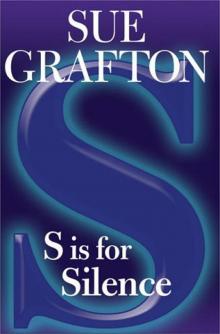 S Is for Silence
S Is for Silence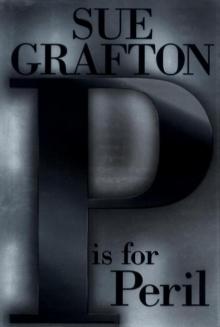 P Is for Peril
P Is for Peril R Is for Ricochet
R Is for Ricochet J Is for Judgment
J Is for Judgment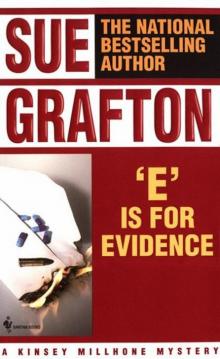 E Is for Evidence
E Is for Evidence T Is for Trespass
T Is for Trespass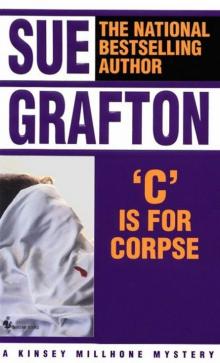 C Is for Corpse
C Is for Corpse U Is for Undertow
U Is for Undertow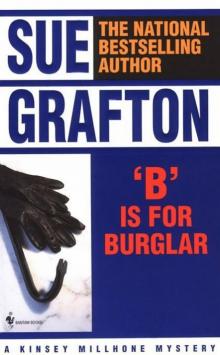 B Is for Burglar
B Is for Burglar Four Sue Grafton Novels
Four Sue Grafton Novels D Is for Deadbeat
D Is for Deadbeat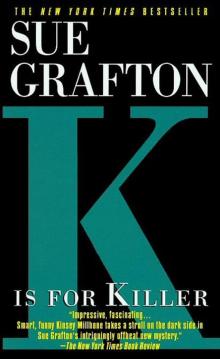 K Is for Killer
K Is for Killer I Is for Innocent
I Is for Innocent A Is for Alibi
A Is for Alibi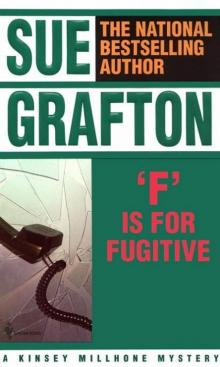 F Is for Fugitive
F Is for Fugitive Q Is for Quarry
Q Is for Quarry W Is for Wasted
W Is for Wasted Kinsey and Me: Stories
Kinsey and Me: Stories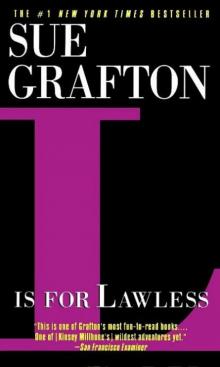 L Is for Lawless
L Is for Lawless Y Is for Yesterday
Y Is for Yesterday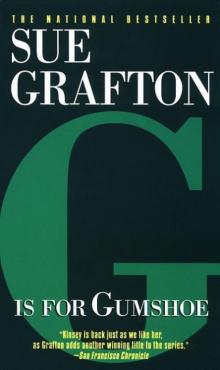 G Is for Gumshoe
G Is for Gumshoe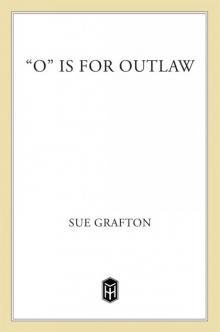 O Is for Outlaw
O Is for Outlaw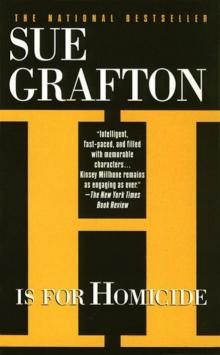 H Is for Homicide
H Is for Homicide X
X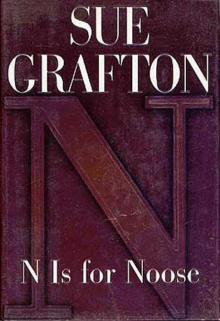 N Is for Noose
N Is for Noose Three Complete Novels: A Is for Alibi / B Is for Burglar / C Is for Corpse
Three Complete Novels: A Is for Alibi / B Is for Burglar / C Is for Corpse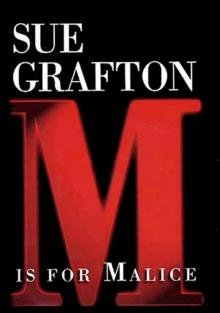 M Is for Malice
M Is for Malice I is for INNOCENT
I is for INNOCENT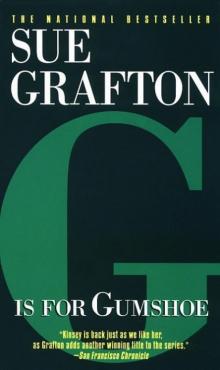 G is for GUMSHOE
G is for GUMSHOE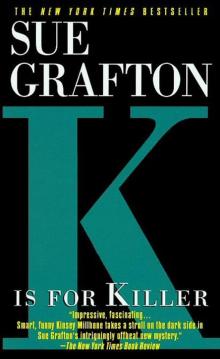 K is for KILLER
K is for KILLER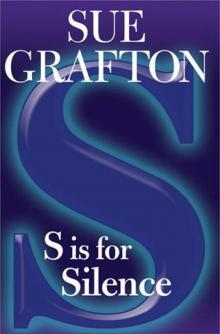 S is for SILENCE
S is for SILENCE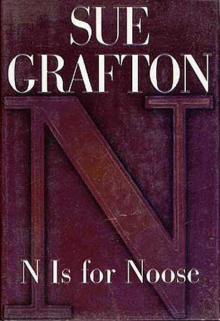 N is for NOOSE
N is for NOOSE D is for DEADBEAT
D is for DEADBEAT V is for Vengeance
V is for Vengeance U is for Undertow
U is for Undertow W Is for Wasted km-23
W Is for Wasted km-23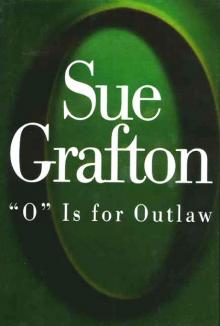 O is for OUTLAW
O is for OUTLAW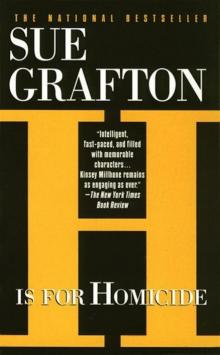 H is for HOMICIDE
H is for HOMICIDE Sue Grafton Novel Collection
Sue Grafton Novel Collection Kinsey and Me
Kinsey and Me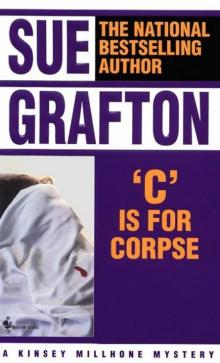 C is for CORPSE
C is for CORPSE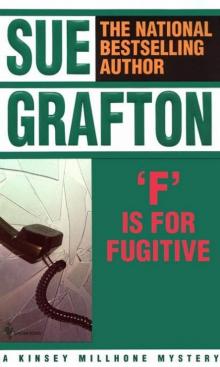 F is for FUGITIVE
F is for FUGITIVE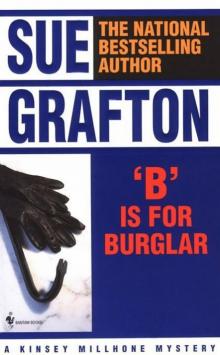 B is for BURGLAR
B is for BURGLAR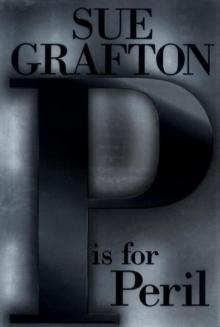 P is for PERIL
P is for PERIL A is for ALIBI
A is for ALIBI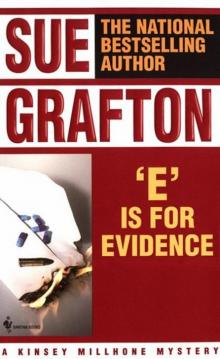 E is for EVIDENCE
E is for EVIDENCE J is for JUDGMENT
J is for JUDGMENT Q is for QUARRY
Q is for QUARRY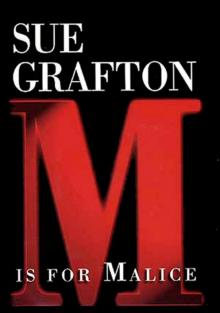 M is for MALICE
M is for MALICE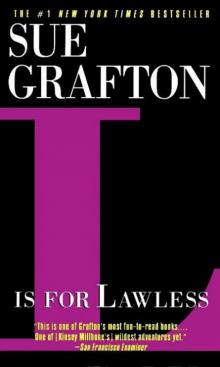 L is for LAWLESS
L is for LAWLESS